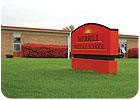
A corn-burning boiler, powered by 7,200 bushels of corn each year, is expected to decrease the Merrill Community School district’s reliance on fossil fuels and to reduce annual energy costs by $10,000.
Like thousands of districts around the country, Merrill Community Schools, a district that serves over 800 students in Saginaw County, MI, faced tight budgets, inefficient building systems, and rising energy costs. But while the district wanted to make infrastructure improvements and cut its utility bills, it didn’t want to place an additional burden on the community. So turning to taxpayers for assistance or redirecting money was out of the question.
With no money to allocate to building renovations, the district started searching for alternative methods to tackle its facility and energy concerns. School officials knew they needed a solution that would go beyond a few new pieces of equipment and minor repairs. They also targeted improvements that would have a lasting and positive environmental impact. However, they didn’t know the outcome would be one for the record books.
Inevitable changes
“We had 25-yr-old technology with inefficient and failing heating systems,” said John Searles, superintendent of Merrill Community Schools. “Classrooms would be 85°Fin the winter and doors would be open. We were literally paying to heat the outside.”Combined with a leaky roof at the high school and recurring maintenance needs at the district’s other facilities - elementary school, middle school, and administrative buildings - upgrades and renovations were essential. A 30% to 40% increase in utility prices also sparked an interest in looking at creative, renewable technology.
District officials chose Honeywell to help provide insight and solutions for their needs. The resulting project was made possible by an energy conservation improvement bond from the Michigan Municipal Bond Authority, which allows schools to implement performance contracts and provides the initial capital for improvement projects.
The district will save $1.4 million in energy and operational costs because of the Honeywell-led improvements. The company guarantees the energy savings will pay for the upgrades over the term of the 15-yr contract so the project will not affect the district’s operating budget.
Unique upgrades
Based on the district’s desire for a renewable component, Honeywell installed a corn-burning boiler to heat the district’s middle school by turning bushels of corn into usable energy. The school is the first school in Michigan - and one of the first in the nation - to use this alternative fuel technology as its main source of heat.The boiler, powered by 7,200 bushels of corn each year, will decrease the district’s reliance on fossil fuels and is expected to reduce annual energy costs by $10,000, a significant increase over the projected $2,000 the district would have saved with a new, traditional gas boiler.
“We looked into many options, but corn’s availability, pricing stability, and clean, emission-free burning properties made it especially appealing,” Searles said.
Other renewable energy work includes the addition of a waste oil heater in the maintenance building, which will help the district realize more than $2,000 in annual energy savings. The heater will run on waste oil collected from the district bus garage, further decreasing the district’s reliance on natural gas.
Another significant project was upgrading the district’s existing control system to Honeywell Enterprise Buildings Integrator_ (EBI), a facility management platform that integrates HVAC, security, life safety, and other core building functions. Through EBI, the district can monitor and control individual pieces of HVAC equipment across the district from a single workspace.
In addition, EBI immediately notifies facility personnel of any abnormality, such as a downed boiler or a classroom that becomes too hot, allowing the district to better deal with issues as they arise. Honeywell also helped the district lower energy consumption and increase savings by installing energy efficient lighting with occupancy sensors in all district buildings, performing boiler tune-ups to ensure optimal performance, andinstalling a new roof on the high school.
Besides the financial and environmental benefits, Merrill plans to use the corn-burning boiler and other improvements as an educational tool to teach students about renewable energy and the environment. “We’re trying to be better advocates of the environment while providing students with an improved learning space,” Searles said. “Hopefully more schools will follow suit.”
